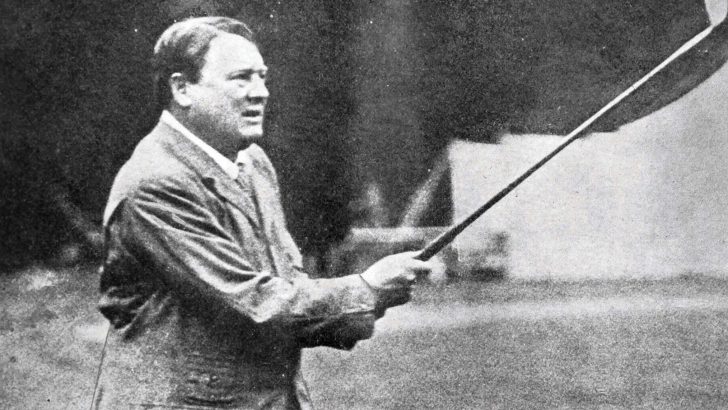The Chief: the Life of Lord Northcliffe by Andrew Roberts (Simon & Schuster, £25/€29.00)
In Ulysses, James Joyce refers to “Harmsworth of the farthing press”. He thereby denigrates the great achievement of Alfred Harmsworth, Lord Northcliffe, in creating the first mass circulation newspaper in these islands – the Daily Mail, launched in London in 1896.
It was very much a new thing. Priced at a halfpenny, it was half the price of its cheapest rivals. Moreover, it adopted a more informal style in presenting news and contained features designed to appeal to a wide audience. This represented a revolution in the newspaper business, the so-called Northcliffe Revolution.
Joyce was not alone in being sniffy about the Daily Mail. Lord Salisbury, the British prime minister at the end of the 19th century, dismissed it as “a newspaper run by office boys for office boys”. It was, however, a great commercial success. It made Northcliffe a fabulously wealthy man, and he subsequently built a newspaper empire that included the venerable London Times, the Daily Mirror (sold to his brother Harold, Lord Rothermere, in 1914), the Evening News, several regional newspapers and countless magazines. In the words of Andrew Roberts, author of this new biography of Northcliffe, “not for nothing was he regularly dubbed ‘The Napoleon of Fleet Street’”.
Teacher
He was born in Chapelizod in Co. Dublin in 1865, the son of a teacher in the Royal Hibernian Military School in the Phoenix Park who was later an impecunious barrister in London. The family moved to London in 1867. His mother was of Ulster-Scots Presbyterian stock, and Northcliffe was utterly devoted to her. She outlived him; he died in 1922, she in 1925. Roberts records that Northcliffe had no female friends or confidants besides his mother, not even his wife or his many mistresses.

Pre-eminent
Northcliffe’s pre-eminent position as a press baron – Roberts estimates that his Amalgamated Newspapers company controlled 40% of the daily newspaper market in Britain in 1914 – gave him immense political influence. While never seeking government office for himself, he did not hesitate to use his newspapers to try to impose his will upon the governments of his day.
This led many to claim both during his lifetime and afterwards that he had megalomaniacal tendencies. Roberts largely rejects this charge and argues that his objectives were to advance policies and measures that he believed were in the best interests of Britain and the British Empire.
He did this most spectacularly when his newspapers exposed the incompetence of the British authorities in failing to adequately equip the army mired down on the Western Front in the early phases of the First World War. A leading article on this matter written by Northcliffe himself and published in the Daily Mail on May 21, 1915, is said by Roberts to have been “the most consequential article – for good and ill – ever published by any of Northcliffe’s papers in his lifetime”. It forced Asquith, the long-serving and somewhat indolent Liberal prime minister, to restructure his government in order to strengthen the war effort. He formed a coalition with the Conservatives and created a new Ministry for Munitions to which he appointed the rising star of the Liberal Party, Lloyd George – then a Northcliffe favourite.
Northcliffe regarded Asquith as unfit to be a war leader, and his newspapers would eventually play a key part in the intrigue that brought about Asquith’s resignation in 1916. With Northcliffe’s blessing, Lloyd George then became Prime Minister – though Northcliffe would fall out with him too. Roberts remarks that “Northcliffe did not much like politicians as a tribe, and the long list of those with whom he fell out … can be seen as testimony to his independent-mindedness”.
Ireland
Ireland does not feature much in this book. Northcliffe never actually considered himself an Irishman, and he seems to have had little engagement with the affairs of the land of his birth. At his mother’s urging, however, he strongly supported the Ulster Unionist demand to be excluded from any independence settlement. Once partition was secured in 1920, he accepted the inevitability of some measure of dominion home rule for the rest of Ireland. The support of his newspapers for the Anglo-Irish Treaty in 1921 was an important factor in its acceptance by British public opinion.
Northcliffe never started or acquired a newspaper in Ireland, but nevertheless the Northcliffe Revolution came to Ireland when William Martin Murphy launched his revamped Irish Independent in 1905.
Its antecedent, the Irish Daily Independent, had been founded by Parnell in 1891 at the height of the Parnell Split, and was later the organ of the Parnellite wing of the divided Irish Party.
After the party re-united in 1900, it was sold to Mr Murphy. He transformed it from a penny to a halfpenny newspaper, and shamelessly copied the editorial style of the Daily Mail. Like the Mail, it was a spectacular success – with circulation rising from an initial 25,000 copies per day to over 100,000 by 1915.


 Lord Northcliffe plays a round of golf.
Lord Northcliffe plays a round of golf. 